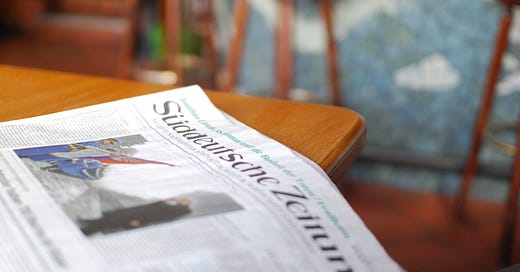A 'spy scandal' at Germany's top newspaper
Dear Reader,
At the end of 2023, the editorial board of the Süddeutsche Zeitung (SZ) had every right to pop the champagne corks after a year in which they set the news agenda.
The bastion of German liberal journalism broke the two biggest news stories of the year. For weeks in June, and again in August, the whole country was talking about little else but their reporting.
First, the SZ published a long investigation into how groupies are supplied to Till Lindemann, the front man of multi-platinum metal band Rammstein.
In an article titled “after the show,” the newspaper detailed how young woman are picked out at concerts to party with the 60-year-old singer, often with the implicit expectation that they’ll serve his sexual needs. The investigation shattered Lindemann’s image as a shy poet (who happens to write graphic rhymes about rape) and led to calls for a boycott of his shows.
The second scoop was on the the boyhood antics of Bavaria’s deputy leader, Hubert Aiwanger. Published in the run up to elections in the southern state, the article pieced together evidence suggesting that Aiwanger wrote and distributed a pamphlet that mocked the Holocaust while a high school pupil in the 1980s. In the aftermath, everyone from Olaf Scholz to drunks at beer tents gave their thoughts on the “Auschwitz pamphlet.”
But 2023 may have been a year that the editorial staff at the SZ were happy to see the back of too - primarily due to the those same two articles.
Rammstein frontman Lindemann sued the newspaper, claiming that it had failed to substantiate its claims of sexual exploitation. In one case, a Hamburg court sided with Lindemann over allegations from the 1990s; in a later case, a Frankfurt court sided with the SZ.
A police investigation that was opened against Lindemann in the aftermath of the SZ investigation was eventually dropped, with prosecutors saying they had found no evidence of wrongdoing.
An updated version of the article on the SZ’s website still claims to contain “numerous cases of abuse of power and sexual assault” but is thin on evidence that Lindemann did anything that broke the law.
In the second instance, initial praise for the newspaper’s revelations about Aiwanger’s teenage years gave way to criticism of the style of the reporting.
Controversially, the article didn’t just report on the facts, it made clear that the SZ hoped that the allegations would “break the wave” of the conservative Aiwanger’s popularity. At the end of the piece, the journalists wrote that “if this is all true, one can hardly imagine him participating in a memorial at Auschwitz.”
“If this is all true” is a somewhat strange remark to end an investigation on. Presumably, if a newspaper were convinced of what it was claiming, it wouldn’t express such self doubt.
Aiwanger responded by claiming that the liberal newspaper’s reporting was a stitch up. His insistence that he didn’t remember why the pamphlet was in his school bag wasn’t very plausible, but his brother subsequently admitted to writing it. That made it look like the SZ had been too quick to point the finger of blame for an incident from the distant past.
In the end, voters sided with Aiwanger. He not only kept his job but secured a record 16 percent in the Bavarian election.
One editor at the SZ later admitted that “we shot ourselves in the foot” with the style of reporting, while another conceded that “we drove voters to Aiwanger.”
Perhaps all that controversy went to the heads of the newspaper’s editorial board.
At any rate, a strange sense of paranoia seems to have crept into their actions. How else to explain the bizarre decision, revealed earlier this month, to spy on their own journalists’ communications…
To read the full article, sign up for membership of the German Review.





